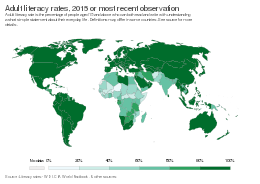সাক্ষৰতা
সাক্ষৰতা (ইংৰাজী: Literacy) বুলিলে সাধাৰণতে কমেও এটা পদ্ধতিত পঢ়া আৰু লিখাৰ সামৰ্থ্যক বুজা যায়; মূলসুঁতিৰ অভিধানসমূহতো এই অৰ্থই প্ৰতিফলিত হয়।[2][3][4] এই দৃষ্টিভংগীত নিৰক্ষৰতা বুলিলে পঢ়িবলৈ আৰু লিখিবলৈ অক্ষম বুলি গণ্য কৰা হয়।[5][6][7]

কিছুমান গৱেষকৰ মতে "সাক্ষৰতা" শব্দটো ঐতিহাসিকভাৱে দুটা সময়ত বিভক্ত কৰিব পাৰি। প্ৰথমটো হৈছে ১৯৫০ চনৰ আগৰ সময়, যেতিয়া সাক্ষৰতাক কেৱল বৰ্ণানুক্ৰমিক সাক্ষৰতা (alphabetical literacy; কেৱল শব্দ আৰু আখৰ চিনাক্তকৰণ) বুলি বুজা হৈছিল। দ্বিতীয়টো, ১৯৫০ চনৰ পিছৰ সময়ছোৱা, যেতিয়া সাক্ষৰতাক লাহে লাহে এক বহল ধাৰণা আৰু প্ৰক্ৰিয়া হিচাপে গণ্য কৰা আৰম্ভ হৈছিল যাক কাৰ্যকৰী সাক্ষৰতা (functional literacy) বোলা হয়।[8]
সাক্ষৰতাৰ পৰম্পৰাগত ধাৰণাটো এইদৰে বহলোৱা হৈছিল যেতিয়া ৰচনা অধ্যয়ন, শিক্ষা গৱেষণা আৰু নৃতাত্ত্বিক ভাষাবিজ্ঞানৰ গৱেষকসকলৰ মাজত সহমত উদ্ভৱ হৈছিল যে কিছুমান নিৰ্দিষ্ট প্ৰসংগৰ বাহিৰত পঢ়া বা লিখাৰ বিষয়ে কোৱাৰ কোনো অৰ্থ নাই— এই অৱস্থাক জেমছ পল গীয়ে "মাত্ৰ অসংলগ্ন" বুলি বৰ্ণনা কৰিছে।[9] আনকি প্ৰতীক-আকৃতিৰ ওপৰত নিপুণতা অৰ্জন কৰাৰ অতি প্ৰাৰম্ভিক পৰ্যায়বোৰো বিশেষ সামাজিক প্ৰসংগত সংঘটিত হয় (আনকি সেই প্ৰসংগটো কেৱল "বিদ্যালয়" হ'ব পাৰে), আৰু মুদ্ৰণ অধিগ্ৰহণৰ পিছত, পঢ়া আৰু লিখাৰ যিকোনো উদাহৰণ সদায়ে এক নিৰ্দিষ্ট উদ্দেশ্য আৰু উপলক্ষ্যৰ বাবে আৰু বিশেষ পাঠক আৰু লেখকসকলক মনত ৰাখি প্ৰণয়ন কৰা হয়। সেয়েহে পঢ়া আৰু লিখা কেতিয়াও সামাজিক আৰু সাংস্কৃতিক উপাদানৰ পৰা পৃথক নহয়।[10][11][12][13][14][15][16][17][18]
কাৰ্যকৰী নিৰক্ষৰতা[19] প্ৰাপ্তবয়স্কসকলৰ ক্ষেত্ৰত প্ৰযোজ্য আৰু ইয়াক বিভিন্ন ধৰণে সংজ্ঞায়িত কৰা হয়; উদাহৰণ স্বৰূপে ক) তেওঁলোকে নিজৰ আৰু সমাজৰ বিকাশৰ বাবে পঢ়া, লিখা আৰু গণনাৰ দক্ষতা ব্যৱহাৰ কৰিবলৈ অক্ষম হয়,[20] খ) দৈনন্দিন জীৱন যাপন আৰু নিযুক্তিৰ কামবোৰ পৰিচালনা কৰিবলৈ পৰ্যাপ্ত পৰিমাণে পঢ়িব নোৱাৰে, য'ত প্ৰাথমিক স্তৰতকৈ অধিক পঢ়াৰ দক্ষতাৰ প্ৰয়োজন হয়,[21] আৰু গ) পৰ্যাপ্ত স্কুলীয়া শিক্ষা, বয়স, ভাষা, প্ৰাথমিক পঢ়াৰ দক্ষতা আৰু আইকিউৰ স্বত্বেও জটিল পাঠ বুজিব নোৱাৰে।[22] ই প্ৰাথমিক নিৰক্ষৰতা (অৰ্থাৎ নিজৰ দৈনন্দিন জীৱনসম্পৰ্কে এটা চমু সৰল মন্তব্য পঢ়িবলৈ আৰু লিখিবলৈ অক্ষম হোৱা) আৰু শিকাৰ অসুবিধা (যেনে: ডিচলেক্সিয়া)-ৰ পৰা পৃথক।[23]
সাক্ষৰতাক ভাৰতৰ মহাপঞ্জীয়ক আৰু লোকপিয়ল আয়ুক্তৰ দ্বাৰা এনেদৰে সংজ্ঞায়িত কৰা হয়, "৭ বছৰ বা তাতকৈ অধিক বয়সৰ ব্যক্তি এজনৰ যিকোনো ভাষাত বুজাকৈ লিখা আৰু পঢ়াৰ সামৰ্থ্য।"[24] ২০১১ চনৰ লোকপিয়ল অনুসৰি ভাৰতৰ সাক্ষৰতাৰ হাৰ ৭৪.০৪%।[24]
তথ্য সংগ্ৰহ
সম্পাদনা কৰক- ↑ "Adult literacy rates, 2015 or most recent observation". Our World in Data. https://ourworldindata.org/grapher/literacy-rates-most-recent। আহৰণ কৰা হৈছে: 15 February 2020.
- ↑ "The quality or state of being literate; educated, cultured; able to read and write - Merriam Webster Dictionary". 2021-01-29. https://www.merriam-webster.com/dictionary/literate#h1.
- ↑ "The ability to read and write; knowledge or skills in a specific area, Oxford learner's dictionary". 2021-02-06. https://www.oxfordlearnersdictionaries.com/us/definition/english/literacy?q=literacy.
- ↑ "The ability to read and write; knowledge of a particular subject, or a particular type of knowledge - Cambridge Dictionary". 2021-01-30. https://dictionary.cambridge.org/dictionary/english/literacy.
- ↑ "The quality or state of being illiterate, especially inability to read or write; a mistake or crudity (as in speaking); Merriam Webster Dictionary". 2021-03-10. https://www.merriam-webster.com/dictionary/illiteracy.
- ↑ "a lack of the ability to read and write; a lack of knowledge about a particular subject; Cambridge Dictionary". 2021-03-10. https://dictionary.cambridge.org/dictionary/english/illiteracy.
- ↑ "The fact of being unable to read or write; the fact of knowing very little about a particular subject area; Oxford learner's dictionary". 2021-03-10. https://www.oxfordlearnersdictionaries.com/definition/english/illiteracy.
- ↑ "Understanding functional illiteracy from a policy, adult education, and cognition point of view: Towards a joint referent framework, researchgate.net". May 2019. পৃষ্ঠা: 111. https://www.researchgate.net/publication/333470256.
- ↑ Gee, James Paul (1989). "Literacy, Discourse, and Linguistics: Introduction". Journal of Education খণ্ড 171 (1): 5–17. doi:10.1177/002205748917100101.
- ↑ Jack Goody (1986). The Logic of Writing and the Organization of Society. Cambridge University Press. ISBN 978-0-521-33962-9.
- ↑ Heath, Shirley Brice (1983). Ways with Words: Language, Life and Work in Communities and Classrooms. Stanford: Cambridge UP. ISBN 9780511841057.
- ↑ Brian V. Street (1984). Literacy in Theory and Practice. Cambridge University Press. ISBN 978-0-521-28961-0
- ↑ Beach, Richard, Judith Green, Michael Kamil, and Timothy Shanahan (educator). Multidisciplinary Perspectives on Literacy Research, 2nd ed. Cresskill, NJ: Hampton P., 2005 [viii]. ISBN 1-57273-626-7
- ↑ Benson Mkandwire, Sitwe (2018). "Literacy versus Language: Exploring their Similarities and Differences". Journal of Lexicography and Terminology. 2 (1): 37–55 [38].
- ↑ Lindquist, Julie. (2015). "Literacy." Keywords in Writing Studies. Paul Heilker and Peter Vandenberg, eds. Utah State University Press, 99-102. DOI: 10.7330/9780874219746.c020
- ↑ Bazerman, Charles, et al., eds. (2018). The Lifespan Development of Writing. Urbana, IL: NCTE. ISBN 978-0-8141-2816-9.
- ↑ Michele Knobel (1999). Everyday Literacies: Students, Discourse, and Social Practice. New York: Peter Lang Publishing
- ↑ Gee, J. P. (1996). Social Linguistics and Literacies: Ideologies in Discourses. Philadelphia: Falmer.
- ↑ "The condition of not being able to read or write well enough to do things that are needed for living and working in society - Cambridge Dictionary". 2021-03-10. https://dictionary.cambridge.org/dictionary/english/functional-illiterate.
- ↑ Vágvölgyi, Réka; Coldea, Andra; Dresler, Thomas; Schrader, Josef; Nuerk, Hans-Christoph (2016-11-10). "A Review about Functional Illiteracy: Definition, Cognitive, Linguistic, and Numerical Aspects". Frontiers in Psychology খণ্ড 7: 111–119. doi:10.3389/fpsyg.2016.01617. PMID 27891100.
- ↑ Schlechty, Phillip C. (2004-04-27). Shaking Up the Schoolhouse: How to Support and Sustain Educational Innovation, Ch. 1, Introduction. Catdir.loc.gov. ISBN 978-0787972134. http://catdir.loc.gov/catdir/samples/wiley031/00009570.pdf। আহৰণ কৰা হৈছে: 19 May 2021.
- ↑ Bulajić, Aleksandar; Despotović, Miomir; Lachmann, Thomas (May 2019). "Understanding functional illiteracy from a policy, adult education, and cognition point of view: Towards a joint referent framework". Zeitschrift für Neuropsychologie খণ্ড 30 (2): 117. doi:10.1024/1016-264X/a000255.
- ↑ Réka, Vágvölgyi; Bergström, Aleksandar; Bulajić, Maria Klatte; Falk, Huettig (May 2019). "Understanding functional illiteracy from a policy, adult education, and cognition point of view: Towards a joint referent framework". Zeitschrift für Neuropsychologie খণ্ড 30 (2): 109–122. doi:10.1024/1016-264X/a000255.
- ↑ 24.0 24.1 2011 Census of India: Chapter 6: "State of Literacy of Rural Urban Population". Government of India, Ministry of Home Affairs, Office of the Registrar and Census Commissioner, India, 2011.